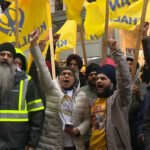
Moon Desk: Religion has public value as a regulator which channelizes public energy for the common good. Religious values irrespective of faith are public in their very nature. All religions are born out of common value systems. To say that religion is a personal matter is a very narrow interpretation of theology. This calls for a need for a clear division of religion’s scope between personal and public. This leads to two initial arguments. Religion has a both public and private role which goes against the popular secular definition of religion as being personal.
And secondly, there should be no conflict and interference between religion’s public and personal roles and neither should there be any over reach of the personal over public or vice versa both within the religion and between them. In its very construct, the public religion flows from the personal and given the ingrained public value it serves public good.
Since forever in India the predominant nationalist secular approach has been to brush away the religious differences as some kind of abnormality without even recognizing them as a value stream. This despite the constitution says otherwise. The Article 25 of the Indian Constitution provides for the freedom to profess, practice and propagate religion subject to public order, morality and health. While the constitution provided for living with the differences, it assumed that people would identify them in the first place.
The lack of awareness and sensitization around the prevalent historical and structural differences between the Abrahamic and Oriental faith and the training to live with it in the society kept the seeds of suspicion alive which created a fertile ground for future maneuvering. Secularism has resulted in Indians knowing more of secular practices than the religious practices of the other faith leading to myths about each other. Despite claiming to have a syncretic culture & a composite heritage, the majority in the majority community are not aware of fundamental tenets of Islam, the belief in Monotheism, Aniconism and Prohibition of Idolatry. It is quite common to come across regions in India where a halal is assumed as some sort of a chicken serving that goes with tomato sauce. Namaz is seen as some kind of an uthakbaithak.
Nothing describes it more succinctly than the random snippets accusing Masjids & Eidgahs of illegal construction, demolition of madrasas, mosques & other religious structure & attack on namazis, are interspersed with the news of Iftar parties, Eid Milan hosted by political parties, competing advertorials carrying Ramazan & Eid wishes & TV commercials that celebrate the delicacies of Eid. Do they even know Eidkisewaiyan just does not taste as sweet when you have no place to offer the namaz or worse when you are shot inside the Eidgah or lynched while returning from Eid shopping. When the situation calls for an outcry, secularism condoles you with mushaira, as if cultural appropriation is a lesser blow.
Despite having coexisted for centuries a newspaper has to carry a piece on what is the difference between Eidul Fitr & EidulAdha. A vast majority still does not know that Muslims follow the lunar calendar or that the Eid date cannot be predetermined and is only confirmed after the moon is sighted. A skull cap becomes a sign of solidarity, a scarf a sign of backwardness & if it is desirable the reverse can be true & so can be all other combinations so long as the intention is not to acknowledge the identity but at worst stereotype or at best whitewash the differences. All markers of Muslim identity are popularized to serve the larger liberal agenda or target audience as the case may be.







